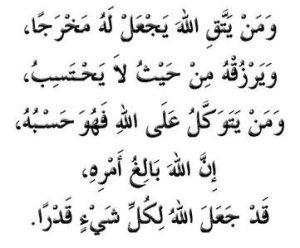

“… And for those who fear Allah (Taqwa or high God-consciousness), He [ever] prepares a way out. And He provides for him from [sources] he never could expect. And if anyone puts his trust in Allah, sufficient is [Allah] for him. For Allah will surely accomplish His purpose: Verily, for all things has Allah appointed a due proportion.” (Surah at-Talaq 65:2-3)
Historically, Rasulullah (sallallahu ‘alaihi wa sallam) never named the above passage from the Holy Qur’an the “1,000 Dinars” verse, but many unverified stories have appeared over the years including one version where Prophet Khidr (‘alaihissalam) was somehow responsible for helping some poor man out of debt by advising him to recite this verse daily. As a result, you can find the “1,000 Dinars” verse hung on the walls of many Muslim shops, offices and households all over the country today. The tenacity with which these business and home owners hold on to the faith that this verse will help bring opportunity and other forms of bounty from Allah Almighty is so great that it would be considered almost sacrilege not to believe in its miraculous power of attraction. However, when it comes to income-related aspirations, most Muslims will normally visualize it to be in the form of the local or the various international paper currencies in the market, and not the Shari’i gold dinar that the verse was aptly named after.
It would have been inconceivable 1,400 years ago to associate a verse from the Holy Qur’an with something so unholy as usury-based ‘fiat’ money, but that is the sad reality of life as most Muslims today do not remember the Shari’i gold dinar that was once the Sunnah currency of Islam during the era of Rasulullah (sallallahu ‘alaihi wa sallam) and the Khulafa ar-Rashidin (radiyallahu ‘anhuma). The Holy Prophet (sallallahu ‘alaihi wa sallam) reminded his Ummah to forsake Riba or usury in his Farewell Sermon on Mount Arafah on the 9th of Zulhijjah in the 10th year of Hijrah, but we have instead embraced and institutionalized the very thing that was strongly forbidden by Allah Almighty in His infinite Wisdom.




No comments:
Post a Comment